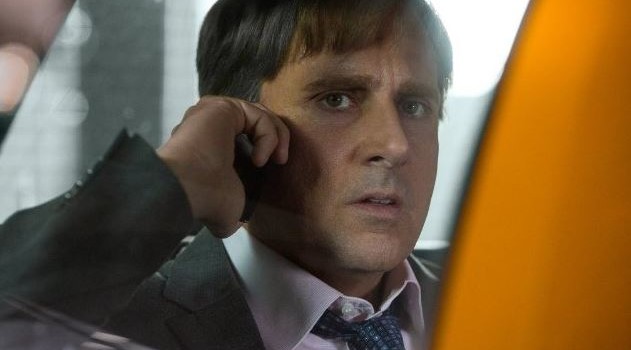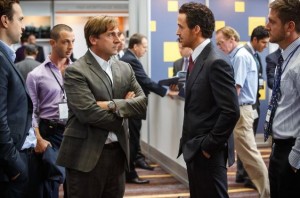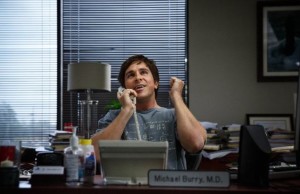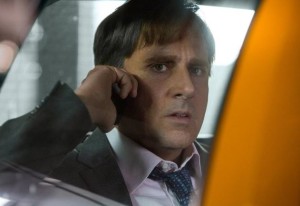The financial crisis that came deathly close to sending the United States and world economy into a depression, has been the subject of many a storyteller in recent memory. Yet, none has ever quite been able to make accessible to the masses the tale in a way that informs, entertains, enlightens and as it should, enrages. When Michael Lewis’ book The Big Short: Inside the Doomsday Machine arrived, director Adam McKay (who co-wrote the film’s screenplay) had his framework to craft a film that would do all those previously mentioned things that brings audiences into theaters. After all, Lewis worked magic with the financial circus that is baseball in Moneyball!
McKay’s The Big Short is nothing short of brilliant. It is a master class in boiling complex problems and issues into a meaningful format that is approachable. Heck, it’s even mentioned by Ryan Gosling’s Jared Vennett (who also narrates) that bankers and financial types use phrases and word combinations that scare away the public, most likely in an effort to keep them in the dark. Well, average Americans were completely blind to what was happening and the entire American way of life came inches from being completely destroyed in the process. McKay and his team not only had Lewis’ book to “translate” financial jargon into meaningful language, but the filmmaker also did so in such a way that is equally as hilarious as it is jaw-droppingly raw in how criminal it was what the banks did to the public.
The Big Short is in many ways, the story of how a handful of bright, an opportunistic, people saw the fiscal abyss coming and tried to warn anyone who would listen. Yes, in the process they sought to seek financial gain from it, like betting against the house in Vegas. But, they did see it coming and it all started with an eccentric medical doctor-turned financial whiz named Michael Burry (Christian Bale).
Burry is as unconventionally Wall Street as they come. He wears shorts and sandals and blasts death metal from his office while starring at numbers and seeing things that no one else can see. What he saw in the mid-2000s were banks moving bad housing loans in ways that would surely never work well in the long run. So, he used his firm’s vast resources to buy out these bad loans with the idea that he could insure against the loss, fully knowing that that was exactly what was going to happen.
Others noticed what he was doing, like Vennett. Because of his connection to a big bank, couldn’t do anything about it. So, he approached Steve Carrell’s Mark Baum and his investment group to do the same. A handful of others also did the same and one-by-one, through their efforts, we the audience sees the incoming tsunami of economic meltdown coming that the masses are blindingly and blissfully unaware of.
People will lose homes. People will lose jobs. People will lose everything.
And what’s worse… the government does nothing about it, until it’s too late.
McKay has assembled an impressive cast, who keenly get the razor sharp wit and overall message of The Big Short, right to its core. There is not a weak spot in the ensemble. If the spotlight has to go on one or two of them, it is on Bale and Carrell. Bale crafts a performance that is nothing short of brilliance. His character could have been a caricature, but instead the veteran actor gives Burry levels of emotional turmoil that is a combination of supreme confidence and a slight bit of mental illness. It is stunning. Then, there’s Carrell. His turn finds him going places he’s only hinted at before in a drama (like in Foxcatcher). He somehow manages to intertwine someone who seems to be angry all the time on the surface and simultaneously baffled at how deep this financial crisis goes. When he and his team go on a research trip to Florida and meet strippers who have three and four homes with mortgages that seem completely crafted in science fiction, the look on his face is indescribable. It is beyond brilliant.
McKay, at the outset, may have seemed like an unusual choice to helm The Big Short and be the one filmmaker who finally could bring the housing and financial crisis of the late 2000s to life. The Anchorman and The Other Guys director, in fact, is an impeccable choice. His ability to boil these complex issues down in a manner that makes sense and illustrates the high stakes of the criminality of what happened is priceless. Why else is he a fantastic choice? Because of that comedy background, there are many laughs to be had in The Big Short. Again, that is not an easy task to accomplish when dealing with serious issues — such as the legion of banking crooks who almost sent over 200 years of American hard work and ingenuity into the depths of hell.
Grade: A+




